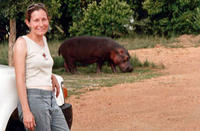
Life goes on.
You can throw a person painful hospital trips, a humiliating breakup, chase them via killer hippo, give them a massive book of old Fantastic Four pages to color, and follow this with the uncertainty of having no income and the evaporation of free accommodation in a beloved national park… and the next day, that person wakes up and is still that person. In this case, me. And I’m still the same person I was the first day of September in the early afternoon in the humid air of Kampala, when I was zipping around town on the back of a motorbike and laughing with the Ugandan driver.
And another thing.
I’m still in Africa.
Which, I realized--after I crawled out of the melodramatic pit of despair on starting over that one goes into on these occasions of feeling alone in the world--is still pretty damn cool.
(Okay, my Gemstone editor had to point it out to me, but then I realized she was right. And people don’t read a blog on Africa to read someone’s whining about their breakup. They read it to read about Africa.)
Then another travel writer pointed out to me that “pushing 40” just meant I could live plenty more lives in the next several years.
On the verge of my next incarnation, I have some decisions to make. Thank you to everyone for your input on the “go home and take a responsible job or stay in Africa” question. I turned down the job, as nearly everyone said I should. Jobs are not a dime a dozen--any more than men I like are--but so what. I hate jobs. And money is just scraps of paper that we collectively agree to hallucinate some value into.
Bored with all this staring at the laptop, I made a trip to Tourist Information today.
My immediate plan is to choose one of the activities available in Swakopmund and get out of the house. See some dunes. Take some photos. More importantly, meet some people as my only interaction with other humans has involved doctors, the Tourist Information woman, and the man who runs the Internet café.
So what can I do? Ah, I can go to the cinema tomorrow night to see “Fantastic Four.” That’s a must, as I just finished re-coloring the old Masterworks FF yesterday.
I can go into the dunes near Swakopmund by horse or camel or by 4x4 tour. Horse is pricier but perhaps worth it. Camel is cheaper but involves dressing up in Lawrence of Arabia garb (uh… no). 4x4 is cheaper but less interesting. Hm, maybe I could face the world-famous Bedouins of Swakopmund after all.
There’s also the possibility of a guided trip to a tribal township, dolphin/seal cruise, or sea kayaking.
Sandboarding, quad-biking, and skydiving are available. I’ve done the first, am too chicken to do the last, and think that quad-biking might not be for me.
Then there’s some other things I want to check out. I think I’ve found a tenant until mid-November for my New Jersey home so I could do these things on a grand circle of the south (if I can deal with the economics).
-Luderitz. It’s said to be a Bavarian town on the Namibian seashore. Sounds interesting, but I’m trying to avoid all things Bavarian. “Don’t even eat Wurst.”
-Fish River Canyon and Orange River. Canoeing and rafting trips run here on the Namibia/South Africa border. Supposed to be quite spectacular. But probably not spectacular enough to spend hundreds of dollars for a few days.
-Shawn in Cape Town. I need to do some retail therapy in Cape Town and my Crazy Kudu leader (Shawn) from http://www.mariesworldtour.com “Crazy Like A Kudu” journal might be able to meet me there.
-pony trekking in Lesotho. Cheap and only a day long, plus a day in and out via Bloemfontaine on public transport. Wanted to do it last time but—oops--went up the other coast.
-from there, I could bus through Gaborone (Botswana) and pretend to be a lady detective like in the books, then bus up to Lusaka. With a little luck, maybe Zambia Tourism will show me something and I can write about it for http://www.GoNOMAD.com.
-then I could head by bus to Nairobi and stay put. From there—dammit--I am going to go to Jinja and I am going to raft the source of the Nile. It’s an hour from Kampala and I didn’t get around to doing it in 2001 or 2005--and I don’t care what it costs, or if it’s raining, or if my ex is there the same day and throws rocks at me--I’m rafting the f’ing Nile.
So who is coming with me?



